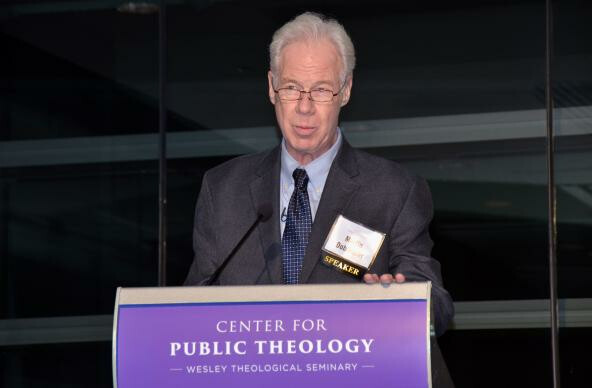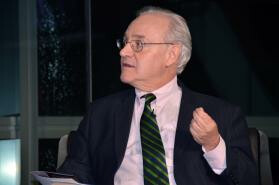New film on Reinhold Niebuhr speaks to today
By Erik Alsgaard

Martin Doblmeier, director, writer
This article reposted from United Methodist News Service.
American theologian Reinhold Niebuhr is best remembered, if he’s remembered at all, for being the author of the Serenity Prayer.
“God, grant me the serenity to accept the things I cannot change; courage to change the things I can; and the wisdom to know the difference.”
The only problem is: That’s not exactly the prayer that Niebuhr wrote. In 1951, the prayer was, “God, give me
That fact is just one of many brought to light in a new documentary on Niebuhr, “An American Conscience: The Reinhold Niebuhr Story,” screened in at the Newseum in Washington. The event, co-sponsored by the Center for Public Theology at United Methodist Wesley Theological Seminary in Washington, and the Religious Freedom Center at the Newseum Institute, drew an overflow crowd to learn more about this quintessential American theologian. The film will begin airing on PBS stations around the country this month.
Martin Doblmeier is the film’s director, writer
“The Niebuhr film is a one-hour documentary about the man I think is the premier public theologian in America in the 20th century,” Doblmeier said. “Honestly, his name is not that well known today, but in the 1940s and into the 1960s, he was probably as close to a pop-star in American culture as a theologian as anybody could be.”
In fact, Niebuhr was on the cover of Time Magazine’s
“It was a very different time in America,” Doblmeier said, “but I think Niebuhr speaks so clearly about universal issues, the notions of our human nature, the uses and abuses of power, the potential for democracy in our country. But to see all those things through the lens of a brilliant theologian was the idea that I wanted to bring to the surface.”

E.J. Dionne, syndicated columnist for the Washington Post, was part of a panel discussion on the film, “An American Conscience: The Reinhold Niebuhr Story.” Dionne said one of the things that surprised him about Niebuhr was the amount of time he spent on the FBI’s Communist watch list. Photo by Erik Alsgaard, UMNS.
The film explores many of the intersections of faith and public life that Niebuhr wrote about. From his support of factory workers in Detroit to his stances on race, the film uses actual recordings of Niebuhr — including a prime-time TV interview with Mike Wallace. The film also uses readings from some of his works, narrated by Hal Holbrook, and interviews with family members and current theologians to show how Niebuhr speaks to us today
A panel discussion after the film brought together Doblmeier with distinguished thinkers in religion today. These included E. J. Dionne, syndicated columnist for the Washington Post; the Rev. Josiah Young III, professor of systematic theology at Wesley; Gustav Niebuhr, acclaimed religion writer and professor at Syracuse University (and grand-nephew of Reinhold Niebuhr); the Rev. Carolyn Davis, director of strategic development for the Public Religion Research Institute; and Mike McCurry, former press secretary to President Bill Clinton and distinguished professor of public theology at Wesley.
Dionne said that one of the things that surprised him about Niebuhr was the amount of time he spent on the FBI’s Communist watch list. “I’m speechless after watching the film, but you can’t say that when you’re on a panel,” he said. He pondered aloud whether Reinhold Niebuhr would be Reinhold Niebuhr today.
The panel also noted the recent reports that current FBI director, James Comey, a United Methodist who studied Niebuhr in college, uses “Reinhold Niebuhr” as his Twitter pseudonym.
The film portrays how the Rev. Martin Luther King Jr. found inspiration and support in his nonviolent cause from Niebuhr. Panelist Young, however, pointed out the ambivalence he saw in Niebuhr’s life with blacks.
“Niebuhr championed black justice,” Young said. “But he also sympathized with whites who didn’t want blacks living next to them. And when it came to admitting black members to his church in Detroit, Niebuhr didn’t support that.”
Gustav Niebuhr said that, for him, the film calls upon religious leaders to speak out.
“Religious leaders can’t afford to be timid,” he said. “The test is coming, and soon.” If the powers that be sense a weakness in the “moral centers,” he said, “they will come after them.”
McCurry said that he thought Niebuhr’s primary message today is to think how your faith challenges and affects life in the public square.
“His ultimate message was that you transcend the self,” he said, “and you participate as a group in the things that make a difference in the community. As he famously said, you could be as moral as you want, but if society is immoral, you’ve got some real issues. That’s the challenge we face today; dealing with that.”
Doblmeier said Reinhold Niebuhr’s timeless insight is that human nature has two sides: “extraordinary potential but also serious limitations, which he called original sin.”
The filmmaker said the theologian championed “the notion of humility, to be able to recognize that we are sinful creatures that continue to have to overcome that, and that we’re dealing in a world of sinful creatures, that we have to create democracies that speak to that; understandings of judgment and power struggles that speak to that.”
“I think those are eternal truths that I think mean as much today as ever,” Doblmeier said.
Doblmeier finished the film last
Alsgaard is managing editor in the Ministry of Communications for the Baltimore-Washington Conference. To get more United Methodist news, subscribe to the free Daily or Weekly Digests.
News contact: Vicki Brown, 615-742-5472 or .
